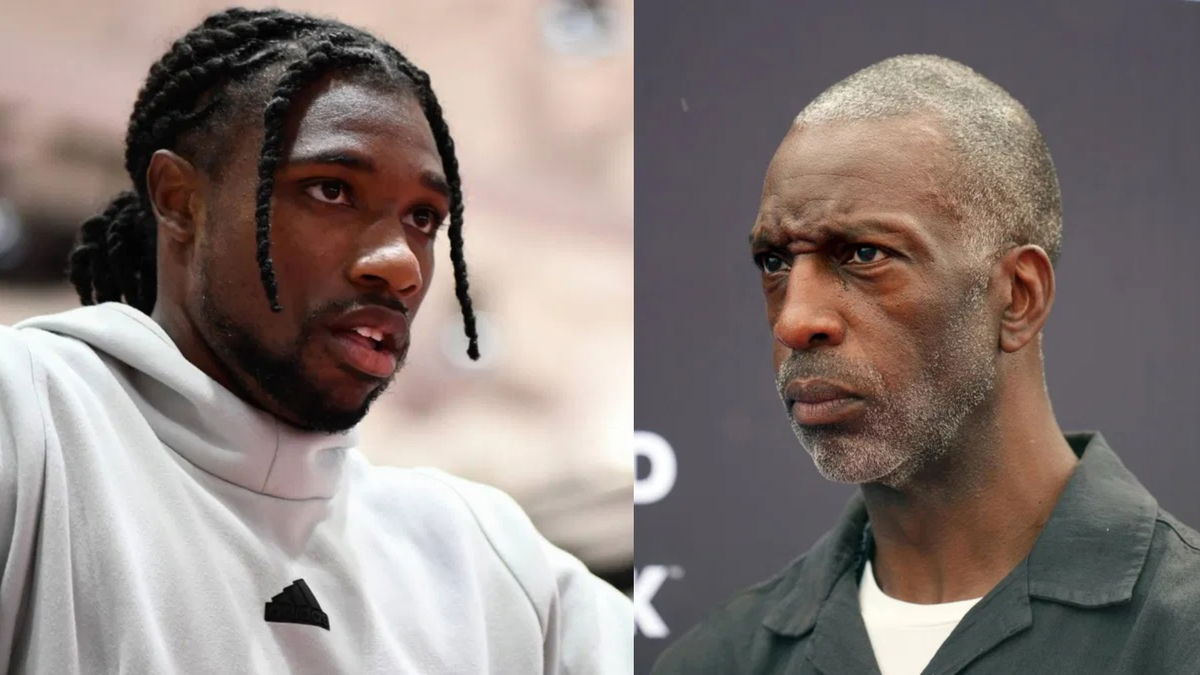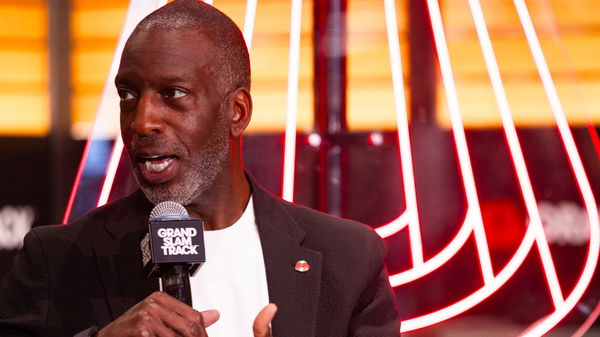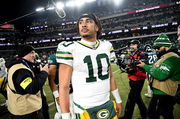
Imago
Credit: IMAGO

Imago
Credit: IMAGO
Once focused solely on blazing speed on the track, the spotlight has now shifted to verbal sparring. Last year, Noah Lyles shattered the U.S. Olympic Trials record in the men’s 200m with a scorching 19.53-second finish, eclipsing Michael Johnson’s 1996 mark of 19.66. But in recent months, the conversation has turned away from performances to pointed criticism, especially of Johnson’s Grand Slam Track (GST) league. Lyles expressed skepticism about the league’s appeal and questioned its financial backing. “Money is not the thing that’s going to drive me every time… who are your outside sponsors, who are your non-track and field sponsors… I haven’t even heard a block’s sponsor,” he said, throwing sharp jabs at GST. According to Lyles, several concerns about the league ultimately kept him from signing up. And Michael Johnson has an answer for him…
Watch What’s Trending Now!
In March, Lyles pointed to the league’s lack of visibility as its biggest flaw. He argued that pouring money into athletes wouldn’t matter much if there wasn’t a wide enough audience to see them compete. When the league abruptly folded, canceling its final event in Los Angeles due to financial difficulties, Lyles remarked, “I’d say my predictions were kind of dead on. unfortunately.” He added that the sudden shutdown meant the league failed to complete even a single full season or reach its intended goals. However, Michael Johnson has offered a contrasting perspective.
ADVERTISEMENT

Credit: x/Michael JohnsonAfter it, the four-time Olympic champion gave Carlos Alcaraz and Jannik Sinner’s example to explain the matter. “Carlos Alcaraz doesn’t have to go around telling everyone he’s the best tennis player in the world because he just beat Jannik Sinner last week or two weeks ago in the French Open,” Johnson remarked. But he emphasized that winning one big match doesn’t automatically make Alcaraz the greatest of all time. To earn that title, the Spaniard will need to keep proving himself by consistently winning championships. At the same time, losing to Alcaraz doesn’t mean his opponent is a failure—it just means there’s another opportunity ahead to bounce back and show their worth. According to Johnson, the same principle applies to track and field: greatness isn’t defined by a single victory, but by sustained excellence.
ADVERTISEMENT
Addressing the issue, Johnson stated, “The problem with track has always been that if you rely on one big event every four years to prove that you’re the best, you’re going to have a problem. And that’s why you’re undervalued.” In his view, winning Olympic gold doesn’t automatically make Noah Lyles the fastest man for the next four years—he has to keep showing up and proving it in every race. But does Lyles share that mindset? Johnson isn’t so sure.
He didn’t hold back, saying, “Noah has the problem that he has. He’s saying, ‘Hey, I want my own shoe. Why don’t I have my own shoe?’ Because you can’t show value because you’re in an event that only takes place every four years.” Johnson’s comments reignited the ongoing conversation about Lyles’ long-standing wish for a signature Nike shoe. But this isn’t the first time the track legend has taken direct aim at the reigning world champion—and it likely won’t be the last.
ADVERTISEMENT
Michael Johnson criticizes Noah Lyles for his Olympic showing
Months before the Grand Slam Track drama took center stage, Noah Lyles was in the spotlight for a very different reason—his performance in the men’s 200m final at the Olympics. Finishing behind Letsile Tebogo and Kenny Bednarek, Lyles claimed bronze. But soon after, headlines shifted from medals to controversy when it was revealed that Lyles had tested positive for COVID-19 before the race. Despite the diagnosis, he chose to compete—something that would have been prohibited under the strict protocols of the Tokyo Games three years earlier.
Michael Johnson didn’t hold back when asked about the situation. Speaking to the BBC, the Olympic legend called it “very bizarre,” questioning not just the decision, but the ethics behind it.
ADVERTISEMENT
Top Stories
Patrick Mahomes’ Dad Faces 10-Year Prison Sentence After Chiefs QB’s Father Reportedly Violated Probation Terms

Prayers Pour In From Jordan Love & Co. as Cowboys Star Mourns Tragic Personal Loss

Justin Jefferson Makes Final Decision on Joining Buffalo Bills After Further Damaging J.J. McCarthy Relationship

Matthew Stafford Makes Final Decision on Retirement After Narrowly Beating Drake Maye For NFL MVP

Multiple PGA Tour Pros Stopped from Playing as WM Phoenix Open Round Is Canceled Over Recurring Problem

PGA Tour Split Into Two as Scottie Scheffler Confirms Stance on Patrick Reed’s Return


ADVERTISEMENT
“COVID is still a dangerous disease. It is just bizarre, the whole thing is really weird,” he said, adding that Lyles had opened the door for critics and conspiracy theories. “There is going to be all of this thing with the Noah haters out there – and he set himself up for it – there are going to be people out there saying it’s not real and he’s faking or whatever.” Still, Johnson admitted he wasn’t fully clear on the current rules, which kept him from digging deeper into the matter. But his remarks left little doubt—he found Lyles’ choice unsettling and morally questionable.
ADVERTISEMENT
ADVERTISEMENT
ADVERTISEMENT